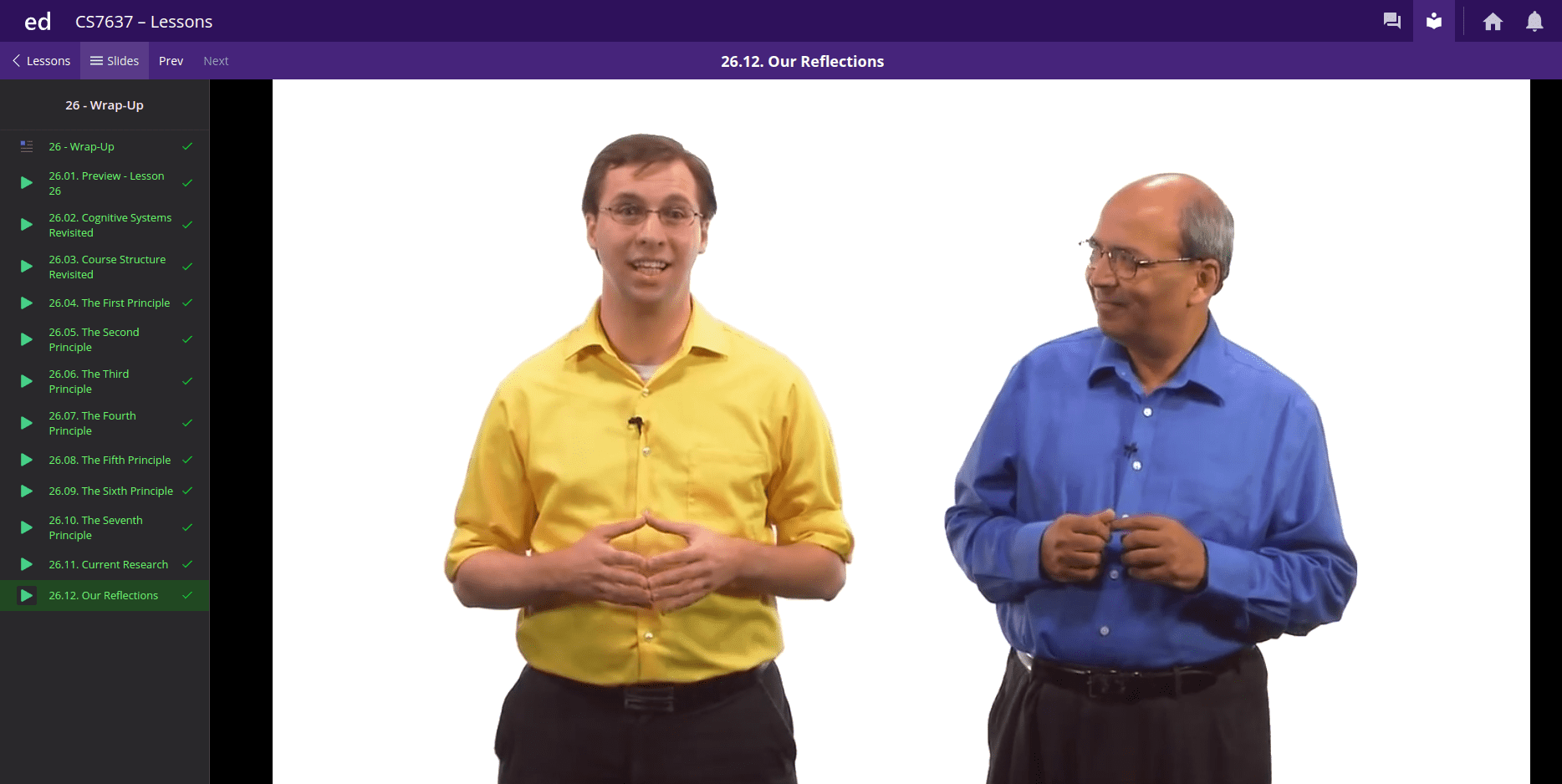Georgia Tech’s Online Master’s Becomes Even More Affordable
In Fall 2022, following the removal of the Special Institutional Fee, OMSCS will become ~18% cheaper.

Georgia Tech’s Online Master of Science in Computer Science (OMSCS) — the largest master’s degree program in the US, in part due to its affordability — will become ~18% cheaper in Fall.
The cost decrease is a consequence of the upcoming removal of the Special Institutional Fee that Georgia Tech students currently have to pay every semester.
Class Central has confirmed with Georgia Tech’s Bursar that, starting Fall 2022, this fee will be removed from all the university programs, including its three MOOC-based degrees: OMSCS, OMS Analytics, and OMS Cybersecurity.
Affordability at its Core
Georgia Tech’s OMSCS, launched in Spring 2014, was the first MOOC-based degree. Affordability was at the heart of its design. At launch, the full degree cost about $7000, while its on-campus counterpart cost north of $40K per year.
As OMSCS Executive Director and instructor Dr. David Joyner explained in an early presentation about the program, OMSCS had three important goals — being:
- equivalent to Georgia Tech’s on-campus degree — notably, in terms of rigor.
- built for the web — instead of amounting to recordings of on-campus lectures.
- low-cost — “probably the biggest thing for many people,” Dr. Joyner noted.
This last goal is enshrined in the program’s mission: “Our motto is Accessibility through affordability and technology,” explained Prof. Zvi Galil, who spearheaded OMSCS’ creation back when he was Dean of Georgia Tech’s College of Computing, and who continuous to give talks worldwide extolling the program’s strengths — most recently, at MIT.
(I had the chance to meet Zvi a few years ago at a conference in Madrid, where he spoke about OMSCS. If you can attend one of his talks, I encourage you to do so. And if you’re in the program, do let Zvi know — he’ll make you part of the talk.)
The importance of affordability was echoed by Prof. Charles Isbell, who succeeded Galil as Dean of Computing and who is also an OMSCS instructor: “the goal was not to make a lot of money […] The goal was basically to at least break even and be able to make a little bit more, so that we could reinvest it into the program.”
This approach struck a chord with learners, because with now over 12K students across more than 100 countries, OMSCS has grown to become the largest master’s degree program in the US and, seemingly, in the world.
Since Georgia Tech debuted OMSCS, other universities have followed suit, launching over 70 MOOC-based degree programs. But none have been able to undercut OMSCS’ cost. The closest competitor, Texas MSCSO, costs $10K.
Special Institutional Fee Removal
On April 12, 2022, the Georgia Board of Regents — which oversees the institutions of the University System of Georgia, including Georgia Tech — voted to remove the Special Institutional Fee that students currently have to pay every semester.
The fee had been introduced to offset some of the cuts to public education funding prompted by the 2008 financial crisis. But starting 2023, the state of Georgia will “increase USG’s budget by almost $230 million, allowing for the fee’s elimination.”
The fee ranges from $172 to $544 per semester, depending on factors like degree program and level. But for OMSCS students, the Special Institutional Fee is always the same: $194 per semester, no matter how many courses the student takes.
Put differently, starting Fall 2022, OMSCS students will save $194 per semester.
Cost: Current vs New
Currently, OMSCS students pay three fees each semester:
- Tuition Fee: $180 per credit hour — 1 course represents 3 credit hours.
- Technology Fee: $107 flat — this fee will remain.
- Special Institutional Fee: $194 flat — this fee is being removed.
OMSCS students have to take 10 courses (30 credit hours) to graduate. So the total Tuition Fee is $5400. Starting Fall 2022, the remaining degree cost will only depend on the Technology Fee and the total number of semesters the student takes to graduate — and not on the Special Institutional Fee anymore.
In his presentation at MIT CSAIL from yesterday, Prof. Galil included a table comparing the current and new cost of OMSCS (courtesy of Reddit). Below is a more complete version of the table.
| Total Semesters | Current Cost | New Cost | Decrease |
| 4 | $6604 | $5828 | 11.8% |
| 5 | $6905 | $5935 | 14.0% |
| 6 | $7206 | $6042 | 16.2% |
| 7 | $7507 | $6149 | 18.1% |
| 8 | $7808 | $6256 | 19.9% |
| 9 | $8109 | $6363 | 21.5% |
| 10 | $8410 | $6470 | 23.1% |
Note that OMSCS students are restricted to taking at most 2 courses per semester until they’ve met some requirements, like having completed 4 courses. From there, they can petition to take 3 courses in Spring and Fall, and 2 in Summer.
So the minimum number of semesters for graduating is 4: 2 courses in Fall, 2 in Spring, none in Summer, 3 in Fall, 3 in Spring. So cost-conscious students who can handle 3 courses per semester will be able to complete their degree for ~$5800.
Tags







Farhang Jalali
I was looking for this information. Thank you so much.
Susan Burns
Does this degree have a focus on Artificial Intelligence and:or web design? I have many years of IT experience and I would like to expand my knowledge of the above disciplines. I know your school is excellent, as I lived in Atlanta for many years. I currently live in Newburyport MA.
Manoel Cortes Mendez
The degree offers five specializations, including two in AI: the interactive intelligence specialization and the machine learning specialization.
https://omscs.gatech.edu/program-info/specializations
A computing degree might be overkill for learning career skills like web design, but you will find some relevant courses in the computing systems and human-computer interaction specializations.
Venkatesh
Is Specialization in Machine Learning part of Online Master’s Program?
Manoel Cortes Mendez
Yes. Here, you can find all the specializations available in the online program, as well as their courses:
https://omscs.gatech.edu/program-info/specializations
The HCI specialization was the last added. Note that only the courses in bold are currently available in the online program; the others are on-campus only, though a couple make their way to the online program every year.
YK
I am a high school teacher of Computing and keen to study a master degree in computer science. Unfortunately without industrial experience, all those online master of CS are too technical for me. Few USA universities offer a master of Computer science education targeting teachers without background knowledge in CS which does not suit me neither.
Please kindly advise.
Manoel Cortes Mendez
The program requires a bachelor’s degree, ideally in computing, but I wouldn’t say it requires industry experience. Having some would certainly help, in particular being a strong coder. And the program does attract many people in the industry, but that’s mainly due to its flexibility, rather than it being a stated goal of the program.
As far as background knowledge goes, the ideal is upper-level, undergraduate computer science knowledge. Applicants that aren’t accepted on their first try are usually asked to take 3-4 courses at that level for credit and reapply.
There are alternatives, but they can be significantly more expensive.
For instance, there’s Penn’s MCIT, which is specifically designed for people that don’t have a computing background but would want one. My understanding is that by the end of the program, student have the equivalent of a BS in CS, in terms of knowledge.
https://www.classcentral.com/course/upenn-master-computer-it-20884
Another alternative is CU Boulder’s MS in CS, which has the particularity of not having strict prerequisites — you don’t even need a bachelor’s degree. Instead, you can gain acceptance by taking specific CS courses on Coursera and doing well in them.
https://www.coursera.org/degrees/ms-computer-science-boulder
Kartik Gada
More proof that this is the wave of the future. The cost is going DOWN, not up.
That is unheard of in University costs, but always visible in technological products and services.
Eshete
Does Georgia tech accept international students for online MS degree courses?
How much does it cost for intranational students?
Eshete
Does Georgia tech accept international students for online MS degree courses?
How much does it cost for course or for the entire program for international students?
Manoel Cortes Mendez
Yes, I believe close to half of OMSCS students are international students. The costs discussed in the article apply to everyone, US and international students.
Robin
After completing, what will be written on the degree? Is it online masters of Computer Science or Masters of Computers Science
Manoel Cortes Mendez
It will say “Master of Science in Computer Science”, same as on campus. It doesn’t say “online” anywhere.
You can check this FAQ > OMSCS Admissions for confirmation: https://omscs.gatech.edu/prospective-students/faq